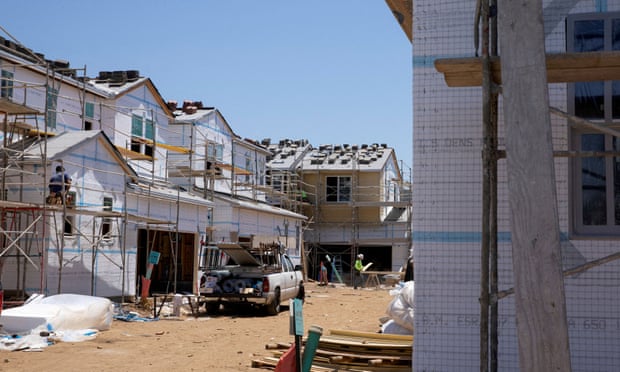It’s over. An era of ever-rising house prices stimulated by cheap money is coming to an end. Central banks created a colossal real estate boom and soon they will have to cope with the consequences of the bubble being pricked.
In China it is already happening. Banks in the world’s second biggest economy are under orders to bail out property developers so they can complete unfinished projects. Mortgage boycotts are on the rise because people are, unsurprisingly, unhappy about paying home loans for properties they are unable to occupy.
Sales of new properties have plunged and new housing starts have almost halved compared with pre-pandemic levels, spelling problems for heavily indebted property companies, the banks they have borrowed from and the wider economy. The property sector accounts for about 20% of China’s gross domestic product. Rising house prices are already a thing of the past.
The US economy contracted for a second successive quarter in the three months to June and one factor was a rapidly slowing property market. In the two years from the start of the coronavirus pandemic in the spring of 2020, American house prices have soared, rising by 20% in the year to May. But the market is cooling fast, with the average price of new homes dropping sharply in June.

Britain appears to be bucking the trend. According to figures from the Halifax, the country’s biggest mortgage lender, house prices are rising at an annual rate of 13% – the highest in almost two decades. Here, too, the picture is changing.
Last week the Office for National Statistics published data for housing affordability, based on the ratio of property prices to average earnings. In Scotland and Wales, the ratio was 5.5 and 6.0 respectively, below peaks reached at the time of the 2007-09 global financial crisis. In England the ratio was 8.7, the highest since the series began in 1999.
Within England there were regional variations. In Newcastle upon Tyne the cost of an average home was 12 times the annual income of someone in the lowest 10% income bracket. In London it was 40 times, and it is almost certainly higher now. The ONS figures cover the period up to March 2021 and since then house prices have comfortably outstripped wages.
There comes a point where housing simply becomes too expensive for potential buyers, but a prolonged period of ultra-low interest rates means it has taken time to arrive at this reality checkpoint. Central banks have made the unaffordable affordable by ensuring monthly mortgage repayments remain low.
That has been true around the world, which is why from New York to Vancouver, from Zurich to Sydney, from Stockholm to Paris the trend in house prices has been relentlessly upwards.
Until now, at least. Central banks in the west are aggressively raising interest rates, making mortgages more expensive. Even before the US Federal Reserve last week announced a second successive 0.75-point increase in official borrowing costs, a new borrower taking out a 30-year fixed home loan was paying a rate of about 5.5% – double that of a year earlier. That increase explains why fewer Americans are buying new homes and why prices are coming down.
In the UK, the Bank of England reduced interest rates to 0.1% at the start of the pandemic and left them at that level for almost two years. That allowed homebuyers to take out fixed-term mortgages at extremely competitive rates, which reached a trough of 1.4% last autumn. But since December last year, the Bank has been tightening policy, and those mortgages will rise when fixed terms run out. Average home loan rates are now 2.9%.
Central banks say the highest inflation in decades means they have no choice but to tighten policy – but they are doing so at a time when major economies are either falling into recession or heading that way. The toxic mix for house prices is rising interest rates, collapsing growth and higher unemployment. Of those only the last is missing, but if the winter is as grim as policymakers expect then it is only a matter of time before dole queues lengthen.
Last week the International Monetary Fund published forecasts for the global economy that were decidedly grim. Noting that all three main growth engines – the US, China and the eurozone – were stalling, the fund said risks were heavily skewed to the downside.
According to the IMF, there have been only five years in the past half-century when the global economy has grown by less than 2%: 1974, 1981, 1982, 2009 and 2020. A complete stop to Russian gas supplies to Europe, stubbornly high inflation or a debt crisis were among the factors that might result in 2023 joining that list. A global housing crash would guarantee that it does.
Sign up to the daily Business Today email or follow Guardian Business on Twitter at @BusinessDesk
That’s not to say there aren’t good reasons for wanting a purging of property market excess. Rocketing housing prices discriminate against the young and the poor, lead to the misallocation of capital into unproductive assets, and add to demographic pressures by discouraging couples from having children.
However, central banks are trying to finesse a soft landing in which the downturn is short and shallow, and the increase in unemployment is sufficient to ease upward pressure on wages but still modest. A house price crash is not part of the plan because it would ensure a hard landing.
There is no appetite for a repeat of 2007, when the US subprime mortgage crisis triggered the near collapse of the global banking system and led to the last big recession before the one caused by the pandemic. That is why the Chinese government is trying to shore up property developers and why western central banks may stop raising interest rates sooner than financial markets expect. We’ve been here before.
























